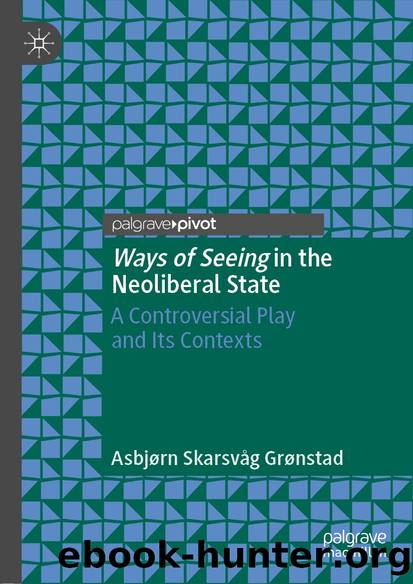Ways of Seeing in the Neoliberal State by Asbjørn Skarsvåg Grønstad

Author:Asbjørn Skarsvåg Grønstad
Language: eng
Format: epub
ISBN: 9783030859848
Publisher: Springer International Publishing
Bejan could just as well be talking about the Ways of Seeing ensemble in this passage. The play unequivocally flags the speakersâ position as culturally marginalized subjects. Their fundamental aspiration is to enlarge the realm of the sayableâthat is, of free speechârather than to restrict it.
Despite being low on shock value, Ways of Seeing was, it is fair to argue, subject to forms of push back that certainly betray some family resemblance to censorship. Notwithstanding the dearth of obscenity, blasphemy, and the kind of provocative gestures that mark many of the cases discussed previously, Ways of Seeing had legal charges pressed against it, a prime minister admonishing its creators, and politicians proposing to cut funding. Comparing the artists to a terrorist group, as the reporter for the major newspaper Aftenposten did, is moreover a rhetorical maneuver drenched in the same intolerance that may in turn lead to censorship. In retrospect, it is obvious that the ensembleâs freedom of speech was being challenged on several fronts. Conspicuously, there was scant encouragement from all those who in other contexts pride themselves on glowingly supporting the freedom of others to emit odious opinions and unpalatable ideas. When in 2012 the uploading to YouTube of the defamatory short film Innocence of Muslims (Nakoula Basseley Nakoula) caused demonstrations in Oslo, Christian Tybring-Gjedde was quick to play the free speech card for a video that even he himself admitted was âreally bad.â43 Fast forward to 2018 and he is, as a member of parliament, behind the proposal to curb state funding for the Black Box Theatre on the grounds that it publicizes âpotentially dangerous conspiracy theories.â44 From a free speech perspective this is a quite captivating inconsistency. In his magisterial study of the significance of free speech in the liberal tradition, John Durham Peters observes that â[l]iberal tolerance, cultural transgression, and conservative offense: such seems the repeated dynamic of free expression in our time.â45 Roughly mapping this tripartite model onto the British-Czech social anthropologist and philosopher Ernest Gellnerâs moral-intellectual alternatives of âenlightenment doubt,â âcultural pluralism,â and âfundamentalism,â Peters claims that the allies of unfettered freedom of expression âare almost invariably friends of modern rationality.â46 Prizing above all disinterestedness and an unbending faith in the possibility of a form of transcendental truth, free speech advocates of a decidedly liberal ilk, Peters holds, unflappably use transgressive communication to exercise (and show off) their commitment to the principles of expressive freedom.
For Peters, the phenomena of liberal tolerance, transgression, and conservative offense are performative as much as deliberational. They represent âway[s] of being or seeingâ informed, respectively, by rationality, relativism, and faith.47 What he calls âthe free speech storyâ obeys a certain dramaturgy, in which âconvention-buster[s]â are cheered on by âliberal enabler[s]â at the expense of the âoutraged bystander.â48 Written more than a decade prior to the much publicized fights over no-platforming, identity politics, and decolonization of higher education in the United States particularly, Petersâs analysis is quite prescient. In the context of contemporary campus unrest, for example, agitators like
Download
This site does not store any files on its server. We only index and link to content provided by other sites. Please contact the content providers to delete copyright contents if any and email us, we'll remove relevant links or contents immediately.
Kathy Andrews Collection by Kathy Andrews(11812)
The remains of the day by Kazuo Ishiguro(8974)
Paper Towns by Green John(5178)
Spare by Prince Harry The Duke of Sussex(5176)
The Body: A Guide for Occupants by Bill Bryson(5080)
Industrial Automation from Scratch: A hands-on guide to using sensors, actuators, PLCs, HMIs, and SCADA to automate industrial processes by Olushola Akande(5049)
Machine Learning at Scale with H2O by Gregory Keys | David Whiting(4292)
Be in a Treehouse by Pete Nelson(4034)
Never by Ken Follett(3937)
Harry Potter and the Goblet Of Fire by J.K. Rowling(3848)
Goodbye Paradise(3799)
The Remains of the Day by Kazuo Ishiguro(3394)
Into Thin Air by Jon Krakauer(3385)
Fairy Tale by Stephen King(3370)
The Cellar by Natasha Preston(3334)
The Genius of Japanese Carpentry by Azby Brown(3293)
120 Days of Sodom by Marquis de Sade(3262)
Reminders of Him: A Novel by Colleen Hoover(3092)
Drawing Shortcuts: Developing Quick Drawing Skills Using Today's Technology by Leggitt Jim(3075)
